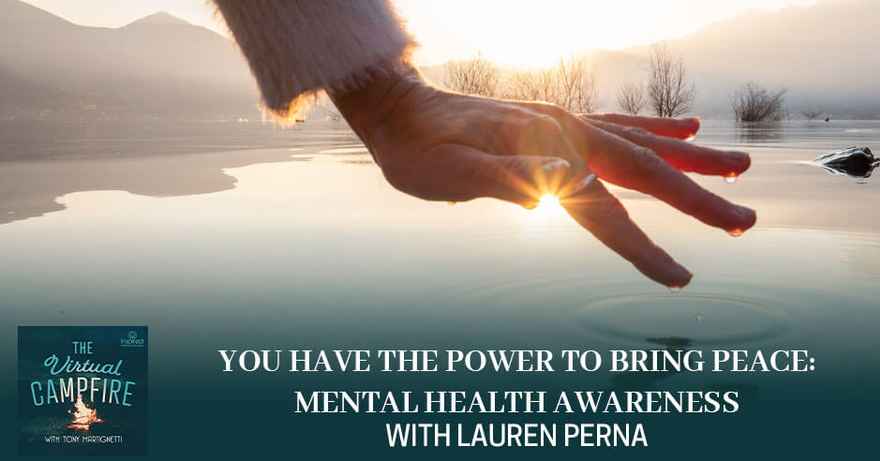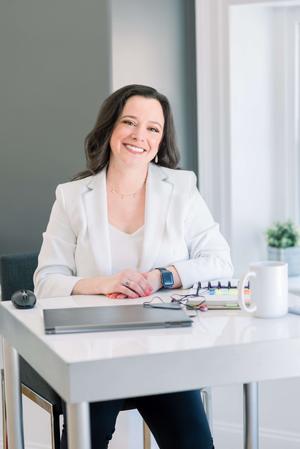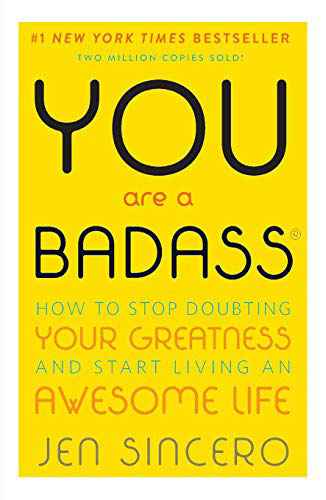You Have The Power To Bring Peace: Mental Health Awareness With Lauren Perna

Mental health is sorely underrepresented in this modern age, even when people talk about it. Tony Martignetti sits with Lauren Perna, CEO & Lead Writer of Lauren Perna Communications. If you’re experiencing mental health issues, you’ll want to hear from Lauren’s story. She suffered from anxiety since childhood. Today, she’s using her gift of writing and creativity to advocate for mental health awareness. Wherever you are right now, it may feel like you're hitting low after low, but you will get to where you want to go. It’s a journey you’re undertaking, and you need to steer your path. Don’t let somebody else steer it for you. Join in!
---
Listen to the podcast here:
You Have The Power To Bring Peace: Mental Health Awareness With Lauren Perna
It is my honor to introduce you, my guest, Lauren Perna. She is the CEO, Head Writer of Lauren Perna Communications, a marketing and communications firm dedicated to delivering powerful messages for companies that are improving lives and inspiring others. It specializes in transforming complex concepts into compelling content. Clients are typically companies in the life sciences and related industries.
Before starting her company, Lauren spent nine years at MassBio helping life science companies raise their visibility. She is also a published mental health writer and a fierce advocate for removing the stigma of mental illness. She is passionate about helping others especially entrepreneurs to treat their mental illness as a superpower.
She received her Bachelor of Arts from Fordham University, earned a Certificate in Digital Marketing and completed the Emerging Leaders Program from UMass Boston. She lives in Dedham, Massachusetts with her partner, son and their dog. She enjoys spending time at their Lake Winnipesaukee house in New Hampshire and has dreams of buying more property and traveling the world. It is my honor and pleasure to welcome you to show, Lauren.
Thank you so much. As a New Hampshire resident, we have a campfire out back at our house so I can truly appreciate the campfire.
The mountains of New Hampshire are something that I truly appreciate. I have climbed up there many times. I love it up there.
Our house is near Gunstock, the little mountain.
I've skied that many times. I am looking forward to digging into your story because you're doing amazing things with your company but the journey to getting there is often fraught with some challenges, ups and downs and things that happened along the way. I'm anxious to see what brought you to this place.

When you're in the moment, it doesn't feel like a big, exciting journey. It feels like you're hitting low after low but you do eventually get there but it is a journey.
The way we work on the show is we allow you to tell your story through what we call flashpoints, points in your journey that have ignited your gifts into the world. What I want you to do is start wherever you like with your story and share what you're called to share but pause along the way. We’ll see what themes are showing up and what we can capture for the audience so they can get a sense of, "What was the lesson? What are the things that you captured along this way that became the gifts that you are sharing?"
It's funny you said the lesson because that's big with me. I always try to find the lesson in everything. That comes from my parents but I'm always looking like, "The situation sucked but what can I learn from it?" I feel like my life is marked by those landmark moments that sucked but what did I get out of it? I also was reading to some of your other guests. Some of them started early on in their life and then some people started a little later on so I was trying to think where do I want to start.
If I'm thinking about myself as a person and not a career person, probably my earliest landmark moment was being a little girl with anxiety. I had a couple of tough years early on that set the tone for a tough childhood even though I had a great childhood. When you do have anxiety, you feel like there's something wrong with you all the time. You can't just let go. You feel like you're wearing a mask.
I was going to say a veil but it's not as transparent as a veil. You have to be putting on a show and find ways to channel your anxiety. Having anxiety as a child did set the tone for my whole life and career, even though at the time, I don't think I realized the impact or what was wrong with me. I grew up in the '80s and '90s, which wasn't a thing. For better or worse, kids are a little bit more acutely aware of mental health and mental illness. Not that it has changed too drastically in terms of stigma. One of my flashpoints is being young, anxious and paralyzed.
As I continue in my young adulthood, I felt like the anxiety transitioned into a little bit of depression and mood disorder. That set the tone as a young adult. That's common too, especially for women. A lot of times, people that have childhood anxiety transform into something a little bit more serious as they are exiting puberty into young adulthood.
Along that way, you're trying to figure out like, "Is this growing up? Is it me or my family situation?" When I first started feeling symptoms of depression, we thought it was ADHD, which if you know me, that's so far off from who I am but that happens a lot to women because they have racing thoughts. That's how people knew how to identify it but I ended up being diagnosed with depression and bipolar in my senior year of college. That journey has ebbed and flowed a little bit as far as a diagnosis but for me, it felt like that mask had turned into a full-on cloak.
It may feel like you're hitting low after low, but you will get there because it’s a journey.
I could not be who I was. Sometimes you get to a certain breaking point. When I couldn't handle it anymore, I felt like the cloak had come off and I was such a failure. I feel like those kinds of diagnoses dictated who I was for a long time. It makes you so aware of your surroundings, which is part of the superpower. You're much more aware of what other people are doing and saying to a fault at points where you're overanalyzing and overthinking.
Did you let anyone in? Did anyone get to know who you are on the inside including yourself?
I saw a therapist and my mom is a clinical social worker. I do like to think of myself as somebody that lets people in and that's a huge part of my platform. What I want to keep advocating for is you have to let people in but I do think I grew up in such a time where the stigma was so great about anxiety, depression and anything that no matter how much I let anybody in, I still wasn't 100% real with it.
For me, it felt so shameful that I never fully even embraced it myself. It felt like I had this huge secret to hide and maybe you'd leave like little breadcrumbs about it. "I was having a little bit of anxiety or something," I say it so casually but the reality is it's crippling and it changed the course of my life. I don't think until I started to finally come into my own over the last few years that I was like, "This is me. Let's get the message out there."
I get a couple of things about that, which is interesting. This is why I love doing this process of looking back at our past because we need to embrace those things and know that they had messages in them that we needed to deal with before we move forward and then see if there are things there that we need to use as a superpower as you say. That's powerful. Thank you for being so honest and authentic.
Anyone who's reading is like, "I don't think I could do that." Know that it's taken me a long time.
What were some of your coping mechanisms to get through? Was it writing something that you did a lot of?

I've always been a writer. Funny enough, I was in the drama club. I'm not a big person that likes to be on video in the age of video but I was in the drama club. I did writing and was honestly an awesome student. To me, that feels like a superpower a little bit because I was so anxious that I didn't want to disappoint my parents. I put everything I had into being a good student.
When you have a mental illness, you feel like you're already trying to play catch up or detract so when you're a good student that veils all the things you don't like about yourself. I'm sure anyone with any insecurity can relate to that but for me, I was feeling super anxious because I was a perfectionist so I was a good student.
I'm no psychologist or anything like that but there's something about energy being a place where it serves you best. You have this energy where you need to be able to push it. Drama is a great place to push it into because you don't have to be yourself. You can be anyone else. It allows you to release yourself of that.
That's why I don't like doing video because it is all myself so I'm trying to get out of that.
Let's continue with your story. You've come to this place where you start to realize you've got diagnoses and you're moving along. What happens next in your journey?
Right from college, I ended up taking a retail management job. I'm a very loyal person. I had worked at a company throughout college and then ended up staying after college. I did retail management, which was pretty good for a person with anxiety, which you may not think about because customers can be brutal.
I was still trying to come to terms with these diagnoses, the ability to have a different type of schedule and not be next to somebody at a desk. This was years ago. There was no such thing as work from home. One of the things I'd like to talk about too is how this environment of work from home and being an entrepreneur has helped my mental illnesses.
Steer your path rather than having somebody steer it for you.
I did that and felt that for a while that worked. I could create the schedule and go in the back room if I needed a minute. Unfortunately, being in retail does not match with a young lady trying to get out in the world, the nights and weekends. I ended up taking a corporate job. This was another inflection point for me. You're around my age. When we graduated college or entered the workforce, it was like, "You have to get a job." This was the quintessential job, a regular old office job. It was not a good match because it was very stifling to the desk. You had to sit at your desk all day.
Being somebody that was on my feet and interacting with customers all day was a hard move. That job did not last long because I was part of the first Great Recession. At the time when I let go, I was devastated because I knew I had to move home with my parents. As a young lady, that's a hard no but that's a huge inflection point in my life because as horrible as it was, it led me to a point where I found my dream job. After the layoff happened, looking back I was like, "That was not a good fit for me being at a desk all day long. The job was pretty cut and dry. You can see I'm a very creative person.
Being in a job that was so cut and dry stifled my creativity and brought out that anxiety even more because for me, creativity is the outlet. Creativity writing, talking to people, helping people and creating programs is how I'm able to channel my nervous energy and depression too because when I help people, I feel better. When you can't do that, it brings out the worst in you. I was always super anxious. The Great Recession was an awesome turning point, believe it or not, even though I was crying in my car after it happened.
I ended up moving back home and lived with my parents for a year. I then found a job in biotech at MassBio. I love telling this story because it's so funny. It's a sign of how old I am. I found the job on Craigslist. Everyone gets a good kick out of that. My younger friends are like, "What?" It was listed as a membership organization. I didn't know about trade organizations. I thought it was YMCA. It said, “Membership assistant at a nonprofit.” I had no idea what that meant.
My start was hilarious and I didn't go in thinking like, "This is my dream job." I'm made it that over time and that is a testament to finding a company that will do that for you. That's why I stayed for so long because I had such a great relationship with them. They saw my strengths and helped me create a role in that I could grow. That flexibility and ability to create your path was huge for somebody like me that is anxious and prone to depression and mood disorders. Having that flexibility and being able to steer your path rather than having somebody steer it for you.
There's something about finding yourself in the right environment that can allow you to thrive especially with anxiety or other mental illnesses. If you have an environment that allows you to show up in the right way then it can create a situation where you're able to open up more, create more of yourself, reveal more of yourself and it starts with trust. If your environment is not serving you then maybe it's time to change your environment.
That is something I preach a lot too when I talk to people about mental health and all that jazz. Your environment has to be right for you. It may not be bright for me but it has to be right for you. For some people, having the stability of that type of corporate job maybe would be a good fit. For me, it was so stifling. I'm such a bleeding heart so being in a nonprofit and life science industry brought out something in me that made me feel connected to the work. If you're thinking about your environment in a career aspect, it's also super important to be passionate about what you're doing.

On a side note, how did you embrace learning the science? Did you have a challenge figuring it out?
I write about it so I lean right into it. I was always good at science. I feel like it was destiny to work in the role I did. I'll never forget when I was graduating high school, I was trying to decide, "Do I want to go into Science, Liberal Arts or Communications?" I picked Fordham because I knew I had the option to do either one. I remember I was like, "I liked science. It's interesting but writing is my passion." I ended up going with a Liberal Arts Degree but it's funny though years after that, I ended up working in this job that combined all those things.
What happens next?
I worked there for nine years, which is a long time. People do not stay that long, especially in life science, which I know you know from your experience there too. It's an industry that moves a lot but as the umbrella part of the industry, it felt right and natural. Everything was always ebbing and flowing. We got to see the change in the industry over the years and meet all new types of companies. My role changed a lot but then a few years ago I was like, "I feel like I've done all I can do here. I don't know what's next."
The thing that I like to point out a lot in this part of the story that people can resonate with is when you have found your dream job or created it and then you get that feeling, that's very confusing because you're like, "This is my dream. I love being here." I would be so happy going into work and then one day that slowly disappeared and I had this feeling like, "I needed something more." When you're in a job that you love with people you like and in an industry that is doing so good in the world, it's very hard to make heads or tails for that. That led to a deep dark depression.
I ended up leaving without anything lined up, taking this leap of faith because I needed to get back to myself, realign and think about what I wanted to do and feel better. I took some time off. People do more in the last few years with everything going on but when I did it a few years ago, it was like, "What?" It’s crazy. It feels like it was so long ago at this point. It was not my plan at all. I was trying to find my next move but I was not having any luck. That was also a lesson and a sign because the universe was telling me, "You got to take a step back. Your target is right for you, Lauren."
It was the universe pointing me in a big arrow to take some time off and figure out what I'm doing. That was a little scary because we bought our house up in New Hampshire but it did work out because our house is set in the forest. It's on the beautiful side of Gunstock. A lot of times me and Tessie, our little dog, jumped in the car and drive up. I would be with my thoughts, thinking about where I wanted to go from there and that eventually led to where I am. It’s being alone in New Hampshire, sitting with it and getting back to myself.
Realign yourself and think about what you want to do to feel better.
It takes a lot of courage to lean into the discomfort that you did. Ultimately, that's what was so challenging about leaving what's called a comfortable job. Oftentimes, what a lot of people find themselves in is this place of, "I know what I'm doing here and things are working." That also is what makes it scary because it's like, "I'm stuck in a pattern." If I want to live fully, I need to get out of this pattern and discover who I am and what I'm made of. Going into the unknown hurts at first.
I am not a person that likes the unknown. That is a huge part of anxiety and people with anxiety do not like to not know. I've never been a person that can embrace. I'm the planner to a T. I've never been a person that's okay with spontaneity. That was huge for me leaning into that uncomfortableness but I have to credit the people around me for supporting me, my family and friends. My job was super cool about me leaving and all that stuff.
The new chapter.
The first year I spent in a little bit of disarray but it wasn't as disorganized as that sounds. I had a bunch of contract jobs and did random freelance work here and there. I've been doing some social media. I'm good at that because I write but I also can turn things into bite-sized pieces. I do a little bit of social media for my old job and all that. I pursued that but I was like, "I need one more real full-time job before I do my thing. I want to do this full-time." I was leaning towards writing on social media.
I was like, "Let me get in with another company." I thought that was going to happen and then the pandemic hit. That was another inflection point. The situation that I thought was going to pan out did not. Once again, Tessie and I hopped in the car and drove up to New Hampshire. In the middle of the night, it was like a fever dream type of situation. I bought LaurenPerna.com and was like, "Tess, here we go."
That was the beginning. Part of what inspired that was the situation but I had been in the pandemic funk that everyone was in. I found a 21-day entrepreneur challenge on Facebook. It was a gentleman whose whole business got turned upside down because of the pandemic. His job was getting people on physical stages and that all went out the window. He did this challenge to lift people out of their pandemic funk. I never do stuff like that with challenges. That's not my thing but I did it. It was so fascinating.
I learned from the amazing entrepreneurs that I didn't know about. His name is Pete Vargas and anybody can find him online. He's super inspiring but his little 21-day challenge had people like Sara Blakely and her husband, Jesse, Amy Porterfield and Marie Forleo. Hearing from those people I was like, "Lauren, what are you doing? You could do this." That's where the buying LaurenPerna.com came from. That was the beginning of the business.

It's remarkable. First of all, one observation is you probably could have never dreamed that you'd be doing this and this is a reality. The other thing and this is maybe a general observation about what you shared, which is to say there's a lot of people out there who are willing to help and offer some advice but you have to be willing to do the work. If you don't want to do the work to follow through then nothing will work. Nothing works unless you work.
It's funny because I'm not a big challenge girl but I was so fastidious about the homework every day and listening to the little podcasts he jumped on every day at 1:00 PM. The star power that he got was insane.
You're doing this business a few years in. Tell me what's lighting you up about this business.
What and who I focused on is ebbed and flowed a little bit. I didn't exclusively focus on my life science network until a couple of months in when I realized it was a natural fit. I strayed away from social media management realizing it is a very challenging industry. I try to do more extremely targeted like LinkedIn support, blog writing and copywriting for websites. I tried to lean into the things that I liked doing with the network that I do have. That's been great. That's been ebbing and flowing.
The one big shift that happened was last June of 2021. I shared my mental health story. I knew that I would eventually after making that thing shift, leave my longtime job because I needed to get better. I remember saying, "I'm going to talk about this one day. I'm not ready yet but I am going to." May is Mental Health Month so I wrote my story. I turned it into a little bit of a takeaway journey, "Here are six lies that my brain tells me that is not true. This is how I frame things." This is how I learned how to do that reframing so I posted it on mediums thinking, "Maybe I'll share it with my family and friends on Facebook."
It got picked up on a bunch of other channels and it went mini viral or viral for me. That lit a fire in me. That's why we're talking about this because I could have come on here and talked about my professional journey but I realized how sorely underrepresented mental health is even in our world where people talk about it all the time. Years ago, no one talks about it. During the pandemic, people have been talking about it but it's still not in a way that we talk about things like cancer. It's still very much an unknown stigmatized thing like, "We need to learn more about it," but it's still different than many other diseases out there.
Once I got the coverage, the tipping point was when somebody commented on the post and said, "I was thinking of doing something terrible and I read your article. You put a half-smile on my face. I'm not thinking about doing that." I'm over-simplifying. It was a person in distress. I sat with that for a while and was like, "I can't want one done. This has to be something I talk about and put out there because no one is to the extent that we should be."
Bring peace and lift people out of their pandemic funk.
I knew that if I could help that one person, that would be enough but if I keep talking about it and keep using my superpowers of writing, feeling and believing in people, who knows what I can do? The business still exists as very much a writing business but the one thing I'm trying to work on is figuring out how to take this mental health advocacy and mental illness awareness to the next level.
I love what you're sharing here because there's something about this feeling of being a vehicle for change. We can amplify that. One person at a time feels so right.
It does, especially the timing in the world. I appreciate that mental health and mental illness are coming to the forefront more so I don't want to discount that. We are in a way different place than we were years ago. Some of the commercials are awesome. It hit the nail on the head but I still don't think that it is given the time and appreciation that it needs.
We're coming to a close soon and I have the second to the last question. What are 1 or 2 things that you've learned about yourself that you want to share with people?
One thing that I've learned about myself that almost any entrepreneur wants to hear at the beginning of their journey is that you know more than you think. Any entrepreneur or person starting a new job, new business or life, whatever feels powerless is like, "What have I done?" When you have anxiety and depression, that is amplified. The mistakes feel rawer and deeper than maybe if you didn't have those diseases.
I learned how to trust myself and recognize when my brain is playing tricks on me telling me like, "Lauren, you suck at this." I've become more aware of those times. The number one thing is learning to trust yourself. The other motto that I live by is something my dad always taught me, which is, "Today's disastrous, tomorrow's delight."
I have an awesome quote by Ruth Bader Ginsburg that's very similar. I always joke like, "I'm sorry, dad, I try to put RBG out there because I'm also a big women's empowerment." I made mugs for my business and put the Ruth Bader Ginsburg quote on it. It is, "Often in life, things that you regard as an impediment turn out to be great good fortune."
On the same thing, she's slightly more famous than my dad. I have mugs for my business and wanted to put a quote on them. I found that and resonated with it. The reason is there’s something that I've learned along the way and anyone can relate to whether you're my dad or Ruth Bader Ginsburg. The lesson there for me is that as bad as things get, they will lead down the right path. I am careful because people in the mental health world don't like toxic positivity. Sometimes by saying, "It is what it is. It all happens for a reason," can fall into that category of toxic positivity. That is not what this is.
This is knowing that your journey will take you to the right place. It's okay to be in a terrible situation and feel awful. You can sit with that and own that but there is a light at the end of the tunnel and you are getting to a better place. If I had thought like, "I'm super depressed. I'm leaving my job. This is it," who knows where I would be? Having that in the back of my head that today's disaster, tomorrow's delight kept me going. It's not toxic positivity. It's a mantra almost. That's how people can view it.
I get the difference and I hope that the readers are grasping on to that. I have one last question. What are 1 or 2 books that have had an impact on you and why?
You Are a Badass by Jen Sincero. It feels like a book that people will recommend a lot. I read every single one of your episodes. I always see it recommended online so I'm not cliché. That's good for this show at least. Someone recommended it when I was in my bad way. It's short self-help bites. I'm a skeptic sometimes when it comes to self-help because there's a lot of information out there and sometimes weeding through the good and the bad can be hard but I loved this book because it was raw, honest and quick to the point. There was no gimmick or anything like that. It was these hardpoints to lift yourself and feel better.
One thing that I have also learned about myself that is super important is that I need a community and people around me that can lift me up when I am feeling low. Anybody needs that but for me, that's what's going to help me get through things. This felt like that in book form. I have it on my shelf. Whenever I enter my office, that's what I see. "You are a badass, Lauren."
I'm so grateful for the stories that you've shared and your insights. It's been a joy to have you on the show.
Keep your eyes peeled because I am starting to put this whole mental health advocacy into its brand, Mentally Fit Founder. My intern is working on something. It'll be fun and it's awesome fulfilling my heart.
There is a light at the end of the tunnel, and you will get to a better place.
Now that it's out there, you have to do it.
I'm committed.
I want to make sure people know where they can find out more about you. Where are you hanging out?
Find me on LinkedIn. My profile is where you'll find the most content but I teach about LinkedIn. I'm always on LinkedIn so find me on there. You can go to my website to LaurenPerna.com, which has everything. The advocacy work is on there too. If we ever take it to another site or brand, all the information will be on there as well. I am on Instagram a little bit but my intern is working on that.
Thank you so much for sharing all that. I thank you again for coming to the show. Thanks to the readers for coming on the journey.
Thank you so much. This has been awesome. It's great to talk about it.
Important Links:
- Lauren Perna Communications
- Pete Vargas
- You Are a Badass
- LinkedIn - Lauren Perna
- Instagram - LaurenPernaComms
About Lauren Perna
 Ever since I can remember, I have been passionate about telling a good story and bringing people together. So naturally, these passions have driven my extensive career in marketing/communications.
Ever since I can remember, I have been passionate about telling a good story and bringing people together. So naturally, these passions have driven my extensive career in marketing/communications.
I have spent the last decade helping life sciences companies and service providers grow their business through compelling storytelling and strategic marketing campaigns. With my unmatched energy and enthusiasm, I have built a reputation for being a trusted partner to my clients and connections.
After several years of freelancing in various communications and marketing roles, I decided to formalize my services into Lauren Perna Communications. My clients appreciate my unique background--I am equal parts writer, creator, and resource. My experience covers the marketing/communications spectrum, so I bring a holistic approach to all my projects. Whether you bring me on to write your website copy or create a content strategy, we'll create a partnership that is tailored to your needs.
Love the show? Subscribe, rate, review, and share! https://www.inspiredpurposecoach.com/virtualcampfire



0 comments
Leave a comment
Please log in or register to post a comment